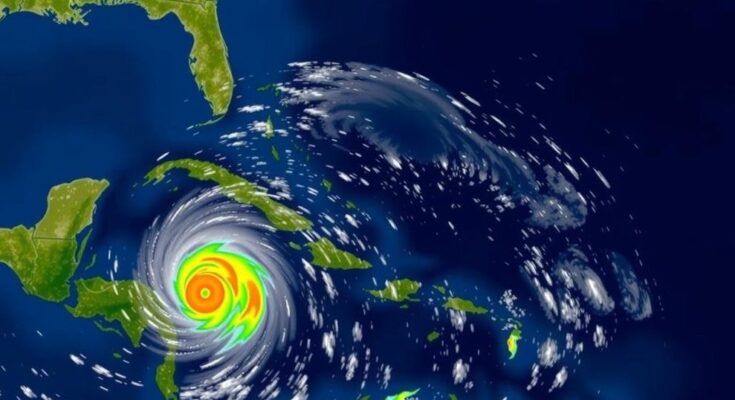The 2024 Atlantic hurricane season was historic, marked by 18 named storms and 11 hurricanes, exceeding average seasonal figures. Hurricanes Beryl and Helene set records for intensity and fatalities. Hurricane Milton’s rapid intensification was unprecedented, while the simultaneous occurrence of three hurricanes in October established a new milestone. Hurricane Rafael was a rare late-season storm in the Gulf.
The Atlantic hurricane season of 2024 concluded with extraordinary records, fueled by unusually high sea-surface temperatures and the cessation of El Niño conditions. A total of 18 named storms emerged, surpassing the average season significantly, which typically produces 14 named storms. Noteworthy were the eleven hurricanes, five of which escalated to major hurricanes of Category 3 or higher, illustrating the unprecedented intensity of this year’s storm activity.
One of the earliest and most powerful storms was Hurricane Beryl, which achieved Category 5 status in July, marking a record for the earliest occurrence of such a hurricane. It caused extensive flooding and power outages across Texas and Louisiana despite weakening during its passage.
Hurricane Helene made landfall in Florida as a catastrophic storm on September 26, resulting in over 150 fatalities, predominantly in the Carolinas. Its unprecedented prediction by meteorologists as a major hurricane prior to its formation exemplified advancements in storm forecasting.
Hurricane Milton, which reached extraordinary strength, intensified at an incredible rate of wind speed increase—90 mph in just 24 hours. This storm produced significant precipitation and was responsible for numerous tornadoes, showcasing the destructive power of these natural phenomena.
Additionally, the month of October witnessed the rare scenario of three simultaneous hurricanes active in the Atlantic basin—a historic occurrence not seen in the 170-year record preceding 2024. Finally, Hurricane Rafael made its mark as a late-season storm, demonstrating the unusual activity within the Gulf of Mexico, where only a handful of November hurricanes have been recorded in the past several decades.
The Atlantic hurricane season typically extends from June 1 to November 30, showing variability in storm formation influenced by oceanic and atmospheric conditions. The year 2024 was characterized by significantly elevated sea temperatures, setting the stage for a record-breaking season. According to NOAA, an average season typically comprises fewer than 15 named storms, making this year’s totals particularly significant.
In summary, the Atlantic hurricane season of 2024 will be remembered for its remarkable intensity and record-breaking events. With 18 named storms and significant fatalities attributed to major hurricanes, this season underscores the evolving nature of hurricanes amid changing climate conditions. The emphasis on monitoring and forecasting advancements has enabled better preparedness for such high-impact weather events.
Original Source: www.theadvocate.com




